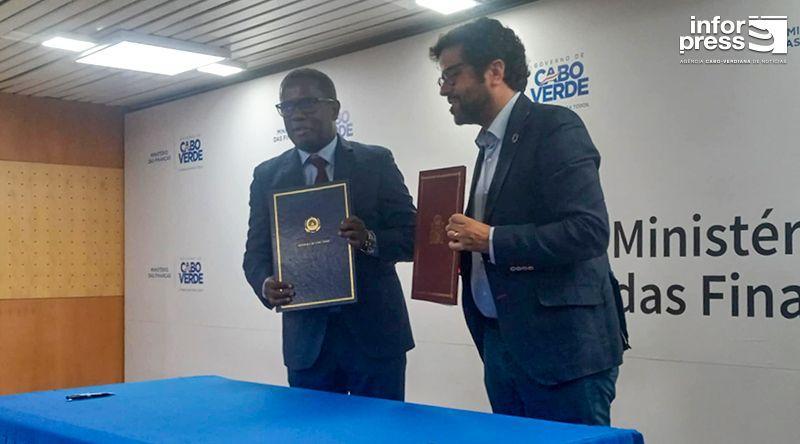Africa-Press – Cape verde. Finance Minister Olavo Correia today called the memorandum of understanding signed between the governments of Cape Verde and Spain for the blue economy a “milestone of great relevance for the country.”
Olavo Correia made these remarks at the signing ceremony of the memorandum of understanding within the scope of providing sectoral budgetary support to the blue economy in an event represented by the Minister of Finance of Cape Verde and the director of the Spanish Agency for International Development Cooperation, Antón Leis García.
The budget support worth 1.5 million euros (163 thousand contos) for the year 2025/2027 will be granted as a non-refundable grant with annual disbursements of 500 thousand euros (50 thousand contos) and will contribute to the country’s development policy, with emphasis on the strategic plan for sustainable development in strengthening the policy for the blue economy.
In his speech, Olavo Correia emphasized that this act represents more than the formalization of financial resources, but the strengthening of a solid partnership, anchored in history, values, but also in the purposes that, together, the countries have been pursuing for a better world and a space of “opportunities and development.”
“By choosing to directly support the implementation of our blue economy policy, which is enshrined and reflected in our strategic document, which we call the Strategic Plan for Sustainable Development (…) the Government of Spain clearly demonstrates a firm, secure and strategic alignment with the structural properties of Cape Verde and with the Government’s vision,” he stated.
The governor, who said that the sea is part of Cape Verde’s identity, economy and vision for the future, argued that the diversification of the Cape Verdean economy involves the promotion and development of the blue economy and the path towards a habitable planet, especially in terms of biodiversity and climate action, but also in the use of the sea for the production of renewable energy and alternative energy sources.
Given the amount attributed, Olavo Correia highlighted that this is much more than robust when compared to previous contributions, claiming that more than the amount, Spain’s presence in the budget support group (GAO) with the vision of Cape Verde is “important for the development of the blue economy.”
“It is important to emphasize that this initiative is part of the budget support group’s dynamics, a privileged space for coordination, alignment, and engagement of various partners, so that Cape Verde can mobilize concessional financial resources to accelerate its development dynamics,” he emphasized, stating that this gesture demonstrates the key commitment to predictability, transparency, and alignment with the country’s national strategic management systems.
He also stated that the country has sufficient reason to remain confident about the future and counting on the partnership of all those who are engaged and determined to help Cape Verde realize its vision of a “more developed, more inclusive and opportunity-filled” nation.
The director of the Spanish Agency for International Development Cooperation, Antón Leis García, when speaking congratulated Cape Verde on its 50 years of independence which, according to him, have contributed to much progress and success, accompanied by partners, but also by “the true protagonists, the people of Cape Verde, who have achieved so many goals in these 50 years, with the support of the international community.”
“Spain reaffirms its commitment to mobilizing public resources, as we are doing in Cape Verde for all African countries, and our main priority is West Africa and countries with which we share values, such as Cape Verde,” he said, emphasizing that Spain wants to mobilize public and private resources to promote climate finance, social cohesion, and inclusive growth.
He also took the opportunity to reiterate Spain’s willingness to support Cape Verde in its progress toward achieving the sustainable development goals, highlighting commitments such as gender equality, the blue economy, ecological transition, economic resilience, and job creation.
“The blue economy represents a unique opportunity to promote inclusive, sustainable growth that generates decent jobs, in harmony with marine resources, which are a common heritage of our societies and the Cape Verdean people,” he emphasized, stating that this agreement is an example of international cooperation geared toward concrete and measurable results.
The Spanish representative also highlighted that the blue economy is a driver of diversification and economic growth for a nation that also lives off the sea, which can reduce vulnerabilities and increase the country’s competitiveness, warning, on the other hand, that the blue economy must go hand in hand with ocean conservation and the fight againstmarine pollution.
“This is a small country in terms of territory, but very large in terms of seas and people. Several people also led this conference, and this support will also contribute to increasing resilience to climate change and better management of marine resources,” he emphasized.
The general objective of Spanish budgetary support is to support the Republic of Cape Verde in implementing its development policy, as established in the main planning documents in force, in particular the current and future national development plans, that is, the second Strategic Plan for Sustainable Development PEDS II 2022-2026 and the country’s successive development plans, both national and sectoral.
It also aims to support the achievement of SDG 14 by supporting the Cape Verdean authorities in implementing their blue economy policy, in accordance with the commitments included in the policy documents, namely those included in the charter for the Blue Economy in the National Strategy for the Sea, as well as in other relevant strategic documents of the country.
For More News And Analysis About Cape verde Follow Africa-Press






